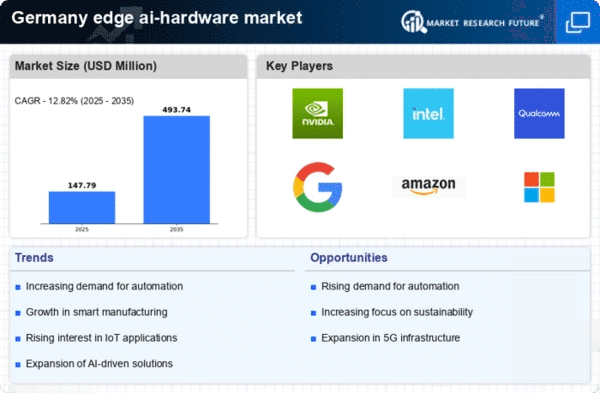Government Initiatives and Funding
In Germany, government initiatives aimed at promoting technological innovation significantly impact the edge ai-hardware market. The German government has allocated substantial funding to support research and development in AI technologies, including edge computing. This financial backing encourages local startups and established companies to invest in edge AI solutions. For instance, the Digital Strategy 2025 outlines plans to enhance digital infrastructure, which is expected to bolster the edge ai-hardware market. With an investment of over €1 billion in AI-related projects, the government plays a crucial role in fostering an environment conducive to growth and innovation in this sector.
Growing Focus on Energy Efficiency
Energy efficiency emerges as a critical driver in the edge ai-hardware market, particularly in Germany, where sustainability is a national priority. Companies are increasingly adopting edge AI solutions to minimize energy consumption while maintaining high performance. The ability to process data locally reduces the need for extensive data transmission, leading to lower energy costs. This trend aligns with Germany's commitment to reducing carbon emissions by 55% by 2030. As organizations seek to comply with stringent environmental regulations, the demand for energy-efficient edge AI hardware is likely to rise, further propelling market growth.
Advancements in Semiconductor Technology
The edge ai-hardware market in Germany benefits from rapid advancements in semiconductor technology. Innovations in chip design and manufacturing processes enable the development of more powerful and efficient edge AI devices. These advancements facilitate the deployment of complex AI algorithms directly on hardware, enhancing performance and reducing reliance on cloud computing. As semiconductor companies invest heavily in research and development, the edge ai-hardware market is poised for significant growth. The introduction of specialized AI chips is expected to drive down costs and improve accessibility, making edge AI solutions more attractive to a broader range of industries.
Rising Demand for Real-Time Data Processing
The edge ai-hardware market in Germany experiences a notable surge in demand for real-time data processing capabilities. Industries such as automotive and manufacturing are increasingly reliant on instantaneous data analysis to enhance operational efficiency. This trend is driven by the need for quick decision-making processes, particularly in automated environments. As a result, the market is projected to grow at a CAGR of approximately 15% over the next five years. The integration of edge AI solutions allows for localized data processing, reducing latency and bandwidth usage. Consequently, this driver is pivotal in shaping the edge ai-hardware market, as organizations seek to leverage advanced analytics to optimize their operations.
Increased Collaboration Between Tech Companies
Collaboration among technology companies is a driving force in the edge ai-hardware market in Germany. Partnerships between hardware manufacturers, software developers, and research institutions foster innovation and accelerate the development of edge AI solutions. These collaborations often lead to the creation of integrated systems that enhance functionality and user experience. For instance, joint ventures focused on developing AI-driven applications for smart cities are gaining traction. This collaborative approach not only enhances the capabilities of edge AI hardware but also expands its applicability across various sectors, thereby stimulating market growth.















